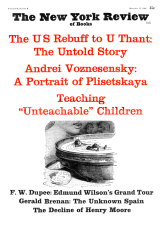“…why do women never want to write poetry about Man as a sex,—why is Woman a dream and a terror to man and not the other way around?…Is it mere convention and propriety…?”
—Jane Harrison to Gilbert Murray
Fatigue, regrets. The lights
go out in the parking lot,
two by two, Snow blindness
settles over the suburb.
Sick with desire
and fastened to a living animal,
your heart utters its great beats
in solitude. A new
era is coming in.
Gauche as we are, it seems,
we have to take our part.
A plaid dress, silk scarf,
and eyes that go on stinging.
Woman, stand off. The air
glistens like silk.
She’s gone. In her place stands
a schoolgirl, morning light,
the half-grown bones
of innocence. Is she
your daughter or your muse,
this tree of blondness
sprung up in a field of thorns?
Something piercing and marred.
Take note. Look back. When quick
the whole northeast went black
and prisoners howled and children
ran through the night with candles,
who stood off motionless
side by side while the moon swam up
over the drowned houses?
Who neither touched nor spoke?
whose nape, whose finger-ends
nervelessly lied the hours away?
A voice presses me back.
If I give in it won’t
be like the girl the bull rode,
all Rubens flesh and happy moans.
But to be wrestled like a boy
with tongue, hips, knees, nerves, brain
with language!
He doesn’t know. He’s watching
breasts under a striped blouse,
his bull’s head down. The old
wine pours again through my veins.
Drive on. Let us be false
to one another, try that on.
And what is keeping faith? when I
melted to you, and you, and you,
and my dress fell in wild
eloquence at our feet,
was what ensued to be our grave?
or just a conversation, ego sum,
tu es, nos sumus? but profound.
I thought by morning to have breathed
the very hyphens of your thought.
Women are taught to cry.
A basic skill that may
have saved a life, or two.
I can do it, watch me, silently,
while you bite your nails,
or aloud, you can turn your head
and listen to that worn-out song
you lost the hang of long ago.
In the year two thousand, frozen tears
were exported to Venus
until we had no more left.
Goodnight, then. ‘Night. Again
we turn our backs and weary
weary we let down.
Things take us hard, no question.
How do you make it, all the way
from now to morning? I touch
you, made of such nerve
and flare and pride and swallowed tears.
Go home. Come to bed. The skies
look in at us, stern.
And this is an old story.
I dreamed about the war.
We were all sitting at table
in a kitchen in Chicago.
The radio had just screamed
that Illinois was the target.
No one felt like leaving,
we sat by the open windows
and talked in the sunset.
I’ll tell you that joke tomorrow,
you said with your saddest smile,
if I can remember.
The end is just a straw,
a feather furling slowly down,
floating to light by chance, a breath
on the long-loaded scales.
Posterity trembles like a leaf
and we go on making heirs and heirlooms.
The world, we have to make it,
my coexistent friend said, leaning
back in his cell.
Siberia vastly hulks
behind him, which he did not make.
Oh futile tenderness
of touch in a world like this!
how much longer, dear child,
do you think sex will matter?
There should have been a wedding
as never was:
two fine creatures sprung free
from castiron covenants.
Instead our hands and minds
erotically waver…
Lightness is unavailing.
Now more than ever seems it rich to die,
while we can still keep moving
and while we still have honor.
Others have felt like this,
three months at sea, their New World sighted,
a low streak on the offshore calm.
Arbella could have jumped
from the ship, her namesake,
for something such. But that land
was Salem, not Cythera.
Arbella too could just have lost her wits.
Catalpas wave and spill
their dull strings across this murk of spring.
I ache, brilliantly.
Only where there is language is there world.
In the harp of my hair, compose me
a song. Death’s in the air,
we all know that. Still, for an hour,
I want to be gay. How could a gay song go?
Why, that’s your secret, and it shall be mine.
We are our words, and black and bruised and blue.
Under our skins, we’re laughing.
In triste veritas?
Take hold, sweet hands, come on…
Broken!
When you falter, all eludes.
This is a seasick way,
this almost/never touching, this
drawing-off, this to and fro.
Subtlety stalks in your eyes,
your tongue knows what it knows,
I want your secrets—I will have them out.
Seasick, I drop into the sea.
This Issue
November 17, 1966



